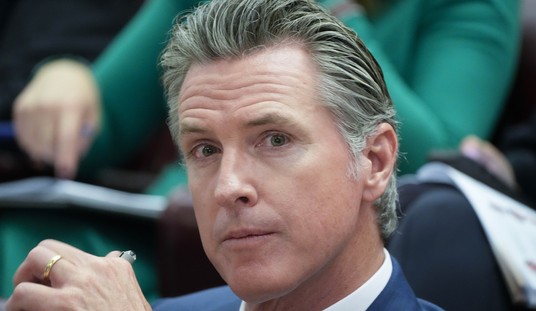“Who cares?” you might say. “Supreme Court justices don’t stand for election.” Right, but the legitimacy of their decisions does depend in part on popular respect for their personal legitimacy. That was the point of Ross Douthat’s column this morning. If you’re thinking that the payoff of the Kavanaugh drama will be the overturning of Roe, you also need to think about left-wing messaging in the aftermath that women’s right to an abortion was taken away with the deciding vote cast by a “rapist.” What will that do to popular support for criminalizing abortion in purple states? What will it do to Republican electoral prospects generally?
The long game being played by Democrats is to damage Kavanaugh so badly that any 5-4 decisions with him on the bench can be delegitimized by extension. Their ideal outcome is to bork him and then ride the momentum to victory in the Senate this fall; if that happens, Schumer might hold open Anthony Kennedy’s seat for the next two years as payback for Merrick Garland or at least exercise veto power over Trump’s next nominee. Since retaking the Senate is no sure thing for Democrats, though — it’s an unlikely possibility, in fact — their next best outcome is to have Kavanaugh confirmed but so badly weakened in the process that the authority of the Court’s conservative majority ends up weakened along with him.
Which is exactly the path we’re on right now. New from Echelon Insights:
We surveyed 1,614 Americans after the Kavanaugh allegations surfaced. The public finds the accusation credible, but many say it isn't disqualifying. pic.twitter.com/xo1Z0zl9vP
— Echelon Insights (@EchelonInsights) September 19, 2018
Those numbers might change. Ford’s recent hesitation to testify won’t help with perceptions of her credibility, for instance. If Ed Whelan’s right that exculpatory evidence is coming for Kavanaugh, that’ll obviously move the dial. You might even view the Echelon numbers as more glass-half-full than glass-half-empty: Just 29 percent believe that what they’ve heard from Ford should disqualify him from the Court. A combined 36 percent believe either that he’s not guilty or that he is but, uh, it doesn’t disqualify him.
Frankly, I don’t want to know what that latter “purple” group is thinking. If he’s guilty of attempted rape, he’s disqualified, no matter what age he committed his offense. And if he’s guilty, that means he’s spent the last three days lying through his teeth about it while Christine Blasey Ford got called every name in the book by angry righties. For cripes sake, purple people, regain your moral bearings.
It’s interesting and encouraging for #MeToo, meanwhile, that the number willing to dismiss Ford’s accusation outright is as small as it is. I’d have guessed that a snap poll on Ford and Kavanaugh would produce a familiar 45/45 split along partisan lines with a small number of undecideds wavering. Not so. With just 19 percent (no doubt almost all Republican) confident that Kavanaugh is innocent, that means a lot of righties are willing to reserve judgment on the allegations until hearing more. That’s a good instinct. I’d be curious to know how different the number might have been a year ago, before the #MeToo drumbeat began.
I’m also curious to know what the polling later this week on confirming Kavanaugh will look like. Echelon asked whether the accusation disqualifies him but didn’t ask the threshold question of whether he should be confirmed in the first place, based on his record before the Ford matter surfaced. Two polls out today, each conducted partially before and partially after WaPo’s story about Ford was published, have some insight into that. The early indications aren’t great. From Reuters:
The Sept. 11-17 poll found that 36 percent of adults surveyed did not want Kavanaugh in the Supreme Court, up 6 points from a similar poll conducted a month earlier.
Only 31 percent of U.S. adults polled said they were in favor of Kavanaugh’s appointment…
“Not after the sexual charges,” said Jeffrey Schmidt, 56, from Colorado, who opposes President Trump and his policies. “Before the allegations, I was not sure.”
Opposition among women to confirming Kavanaugh was up seven points since last month. Bear in mind, it’s very unusual for the public to oppose confirmation of a SCOTUS nominee on balance. Yet Gallup is seeing that same trend:

Dating all the way back to Robert Bork, only one Supreme Court nominee besides Kavanaugh was net negative in the final poll taken of their nomination. That was Harriet Miers, who never made it to a confirmation hearing thanks to strong conservative opposition. (Clarence Thomas, the last nominee to face a sexual misconduct accusation, stood at 58/30 in 1991.) Kavanaugh stands alone as a nominee who might well take his seat on the Supreme Court with a plurality of the public opposed to him. Likewise, since Bork, no nominee has seen less than 20 percent of the opposition party in favor confirming him — until Kavanaugh, who currently enjoys 15 percent support among Democrats. There’s only one silver lining here: If Whelan is right and somehow the last-minute Ford accusation is debunked, there might be so much public sympathy and remorse that Kavanaugh will enjoy a huge boost in popularity as he’s sworn in. That’s the only way this nomination process ends “well” in terms of public opinion for him and the GOP. With a bogus rape charge exposed.








Join the conversation as a VIP Member